As border battle brews between Texas and U.S., tiny Eagle Pass braces for its next conflict
- Oops!Something went wrong.Please try again later.
- Oops!Something went wrong.Please try again later.
EAGLE PASS – Juanita Martinez calls them “Abbott scars.”
After Gov. Greg Abbott’s Operation Lone Star rolled out aggressive new border security measures, including razor wire and a floating buoy barrier in the Rio Grande, she saw firsthand the slash wounds on the migrants who had crossed. She remembers the gash on a 7-year-old child.
So she was elated last week when the U.S. Supreme Court ruled federal agents could remove state officers’ border wire. But she learned Abbott would defy the court order, fueling a growing standoff over constitutional authority at the border.
And that was before she heard about the convoy.
As the forces of global migration, constitutional law and election-year politicking roil America, perhaps nowhere is more shaken than tiny Eagle Pass.
Shelby Park, once a riverfront picnic spot, has become a militarized outpost – a city park where state officials face off with federal authorities over who will control international migration.
In recent weeks, the city has found itself a discomfiting tourist destination for out-of-town visitors who want to lay eyes on the border as a show of solidarity in what they see as an Abbott-Biden standoff.
The next tourists to arrive might be a parade of right-leaning visitors billing themselves as “God’s Army.” Loosely organized online, the small group this week began caravanning toward Eagle Pass under the rallying cry “Take our border back.” Their destination, for now, is a weekend meetup that organizers bill as part political rally, part church revival.
Though nobody in this city of 28,000 knows how many people are really coming – and reports so far suggest a small contingent – everybody in Eagle Pass seems to be bracing for whatever’s next.
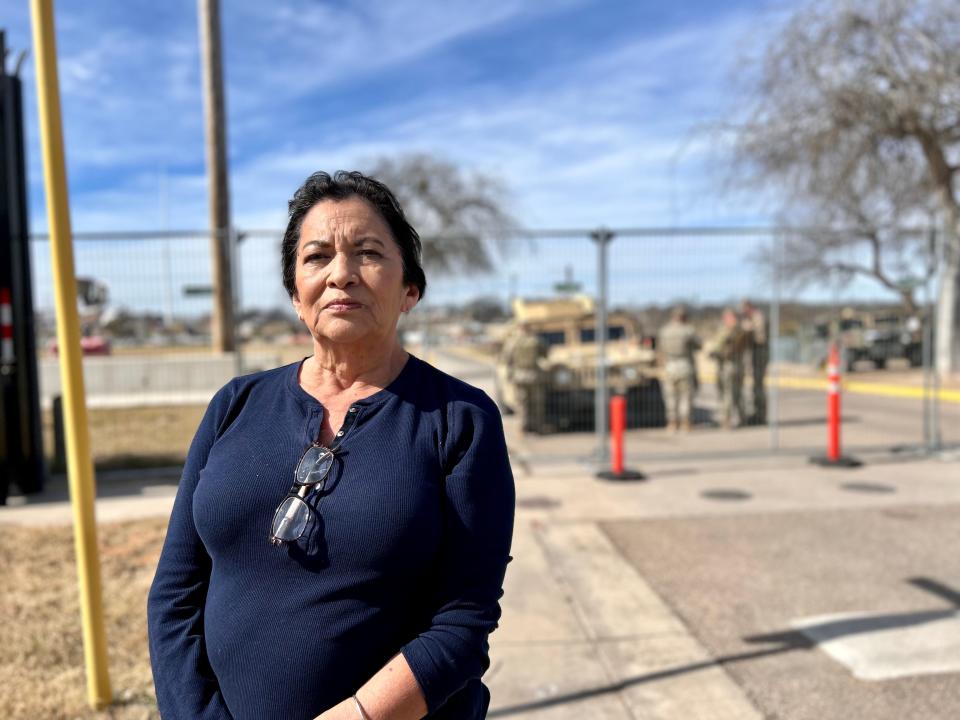
Martinez, 67, a political activist who helps migrants reach their final destination, is worried about the convoy. “It’s scary,” she said. “It’s not going to be peaceful. That’s my concern.”
Richard Flores, 58, a cattle rancher, isn’t opposed to border enforcement. He said he has grown alarmed at the frequency of migrants and the tactics of the smugglers who bring them across his ranch and others. He isn’t opposed to the convoy, as long as it’s peaceful, as organizers insist it will be.
But Flores noted the world has not left Eagle Pass in peace.
Shelby Park itself, he said, was named for Confederate Brig. Gen. Joseph Shelby. Retreating into Mexico in the waning days of the Civil War, Shelby reportedly wrapped his unit’s battle flag around a rock and sank it in the Rio Grande rather than surrender it to Union troops.
“History repeats itself here,” Flores said. “I just hope there’s some resolution.”
Biden's pivot: Why the president is moving to the right in 2024 on immigration
Operation Lone Star and a rising standoff
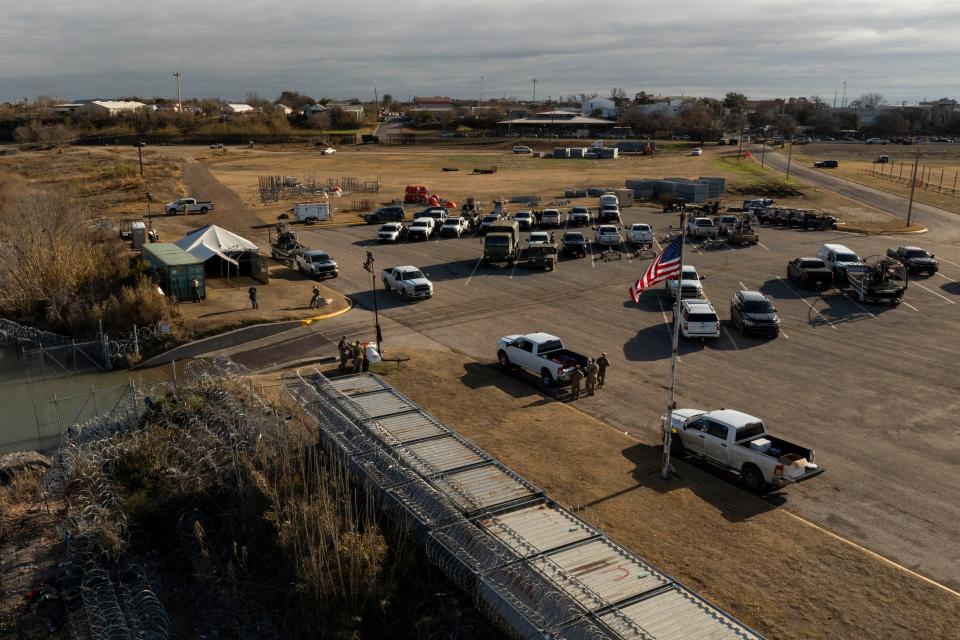
Over nearly three years of Operation Lone Star, Abbott has secured more than $11 billion in border security initiatives. The initiatives are in response to what Abbott has called a failed response by the White House to influxes of migrants.
There’s no doubt border-crossing has risen to levels that surprise even longtime residents. Encounters with migrants in the U.S. Border Patrol's Del Rio Sector, which includes Eagle Pass, have soared in recent years, from 15,833 in fiscal 2018 to more than 152,000 in the first three months of this fiscal year.
The migrant surge has vexed the broader immigration system as Southern states send migrants by plane and bus to cities in more liberal states; Congress and the White House deadlock over a legislative solution; and Donald Trump capitalizes on the controversy by focusing his presidential campaign on border security.
While the national debate focuses on the presidential race, the immediate issue in Eagle Pass is one of practicality. Border Patrol agents say Texas’ rows of razor wire prevent them from reaching the Rio Grande and doing their jobs, including saving migrants in trouble in the fast-moving river.
The Supreme Court last week in a 5-4 ruling let the Biden administration remove the razor wire barriers. Abbott has vowed to keep them in place.
Republican governors in other states latched onto the national attention, signing a letter expressing solidarity with Abbott and saying Texas has the constitutional right to defend itself, and people mused about whether Biden would federalize the National Guard as a means of wresting troops from the state’s control.
On Jan. 12, Texas National Guardsmen at the park along the river in Eagle Pass blocked a supervisory Border Patrol agent from accessing the river as three migrants – a woman and two children – drowned there, according to a U.S. Justice Department court filing.
A militarized scene in Eagle Pass
Shelby Park, the riverfront park that overlooks Mexico, once teemed with family picnics and little league baseball matches. Today, its entrance is blocked by an 8-foot-high aluminum fence. A tan military Humvee sits just inside the main gate as several camouflage-clad guardsmen linger around it, assault rifles slung over their shoulders. Military trucks and stacks of orange buoys line the riverbank, and helicopters patter high overhead, a mix of state and federal entities.
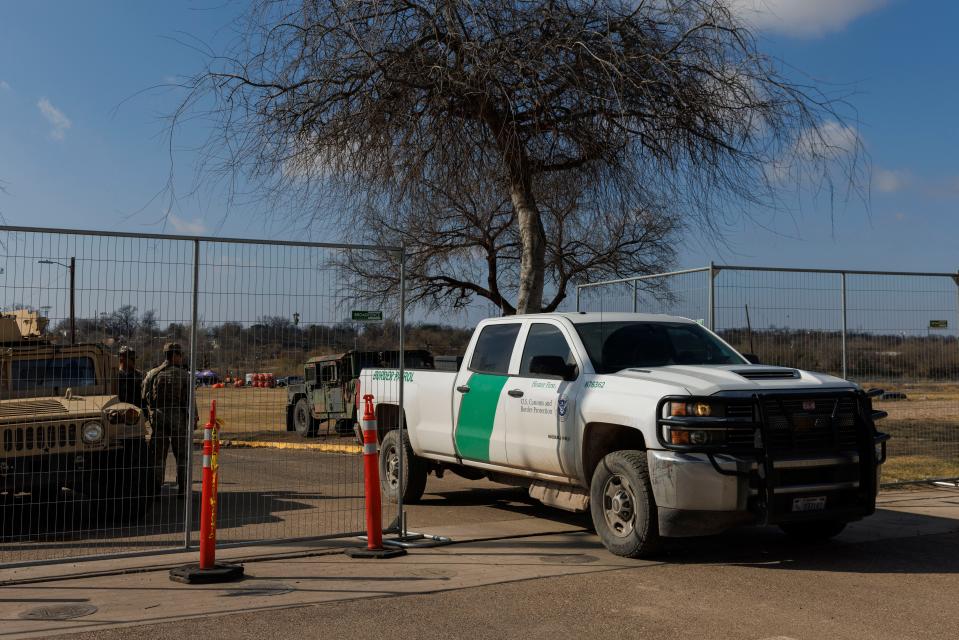
Just outside the park's main gate, news crews and internet bloggers set up live shots and curious onlookers stop to snap selfies. One woman brought an armful of Styrofoam containers containing food and handed it to the National Guard troops on duty.
Brian Segrave, 60, had traveled from his home in San Marcos to Piedras Negras, Mexico, for an outing with his wife. While in the area, the couple decided to visit Shelby Park and see for themselves the place everyone had been talking about.
Segrave said he supported Abbott’s decision to send troops to enforce the border. A convoy of out-of-state supporters, however, was a bad idea, he said.
“Let the state and the federal government hash it out,” Segrave said. “We don’t need outside help.”
Flores, the cattle rancher, is the fifth generation of his family in Eagle Pass. For the past few years, he said, criminals had cut the perimeter fence on his 500-acre ranch in northern Eagle Pass to squeeze border-crossers through. As a result, Flores said, he has lost cattle and has had to pay for costly repairs.
He supports doing more to stem the flow of migrants through his city. But he’s not sure the scene in places like Shelby Park is helping.
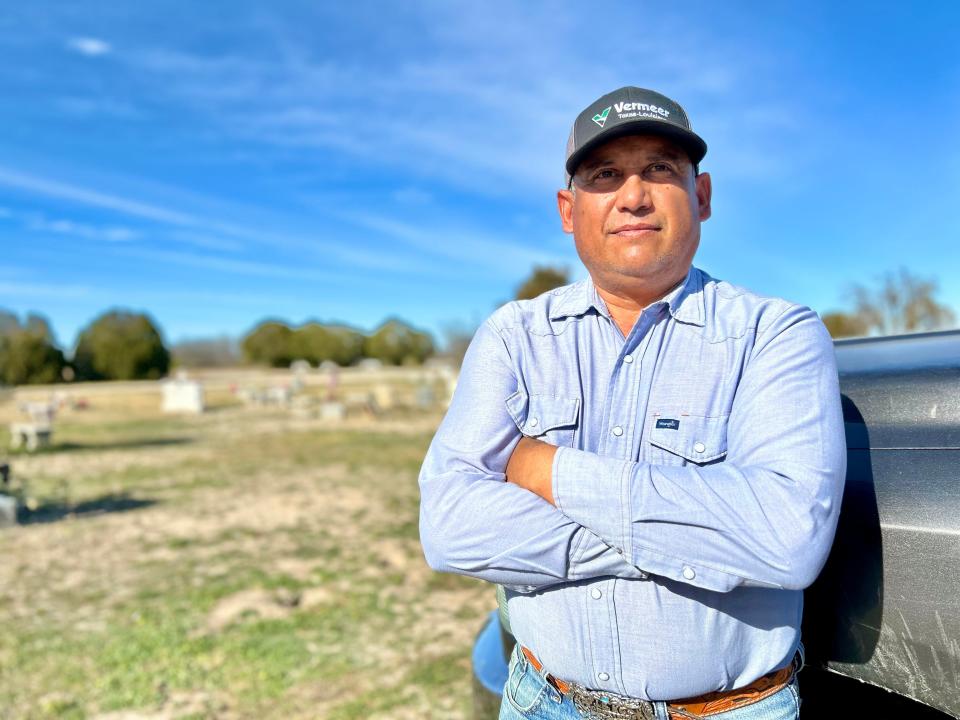
Flores said immigration reform and initiatives like work permits could do more to combat undocumented migration than razor wire and buoys. “They’re just moving them down the river,” he said.
Just up the street, Lety’s Diner sits on Main Street, a small eatery with five tables and plastic vegetables strung over the cash register. Not long ago, the restaurant bustled with morning diners, breakfasting on machacado and chicharron con chile tacos. On a recent morning, the diner was empty save for owner Letty Garcia, 48, and her husband, Victor, 70.
The restaurant used to fill with passersby going to Shelby Park for the day, Garcia said. But since the state commandeered the park, business has all but dried up. Instead of families strolling down to the park, Main Street lately has been filled with screaming ambulances rushing to the river to retrieve migrants slashed by razor wire, she said.
Garcia said she opposes the wire and buoys and the closing of Shelby Park. Most worrying to her is the convoy. Garcia’s 12-year-old son, Jesse, recently read reports of the convoy online and asked if they were going to be OK. She assured him they’ll be fine – but she’s concerned.
“There could be loss of innocent lives,” she said. “It’s not right. I feel helpless.”
Martinez, the activist, said she has been unnerved by the rhetoric used to describe migrants coming to the U.S. to better their lives. She’s also anxious about people coming to the Eagle Pass area to further stir things up. One friend she knows became so rattled she bought a gun.
Martinez said when people use terms like “invasion” and “war” to describe migration patterns, it puts them and others at risk. In 2019, a gunman scrawled similar rhetoric in a manifesto – describing what he saw as an “Hispanic invasion” – before killing 23 people and injuring 22 at an El Paso Walmart
“This standoff between Biden and Abbott could mean civil war would start right here in Eagle Pass, of all places,” she said. “That’s frightening.”
Not everyone opposes the state’s tactics or the incoming convoy. Sandy Sassano said she had become dismayed at reports of groups of migrants – 20, 50 or even 100 at a time – wandering through her city. When she heard of the convoy, Sassano, Maverick County’s GOP chairwoman, reached out to organizers and offered to help.
She knew the move would be unpopular among many of her neighbors in the strongly Democratic county, but she felt it was important to bring awareness to the situation in Eagle Pass and to the flow of undocumented migrants.
“I just want them to stop coming,” Sassano said. “Let us get back to our life. Let Border Patrol do their job. That’s all we want.”
Border scars: Along Texas' floating barrier, migrant children left bloody by razor wire
Will 'Take back our border' convoy arrive?
So far, there’s little sign of a massive turnout for the rally. Though it was promoted widely by right-leaning influencers, video from the second day of the convoy showed a few dozen vehicles.
Standing by the wooden fence posts of Cornerstone Children's Ranch, Anson Bills said he hoped it would be larger. Bills said he helped bring the convoy to this ranch not far from the Rio Grande in Quemado, about 20 miles upstream from Eagle Pass.
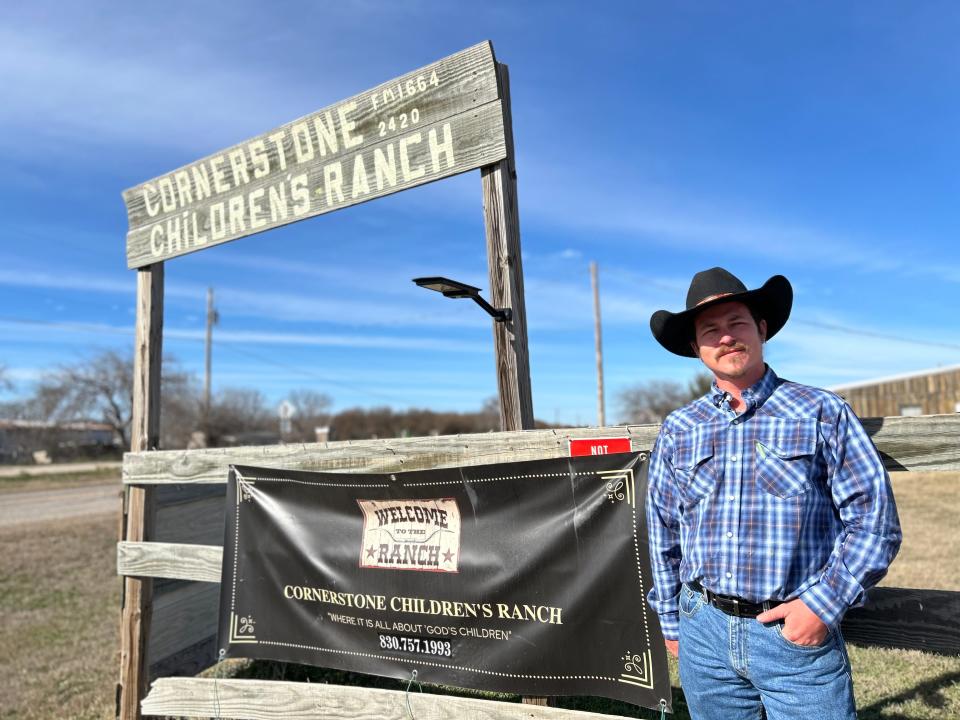
He said he still expects about 6,000 people to show up for the three-day event. Not all of them will arrive with the convoy, he said, noting that people have called him from Brownsville, Amarillo, Lubbock and other cities who will drive on their own.
Another weekend rally was planned to run from San Diego to Yuma, Arizona, though the details of that turnout also remain murky.
Bills is president of the Texas Independence Project, a group that he said patrols nearby ranches and confronts the migrants, calling authorities and waiting until the migrants are hauled away.
He bases his work at Cornerstone, a wide stretch of yellowed grass, a warehouse and a few trailer homes, that is also home to a nonprofit group.
Bills said that last year, he hosted a man named Pete Chambers at the ranch. When Chambers later hatched a plan for a convoy to the border, Bills said he helped make Cornerstone the final destination. (Chambers, who has been widely identified in media reports as the organizer of the rally, did not respond to requests for comment.)
Bills said he was motivated to do something after seeing increases in the number of migrants passing through nearby ranches. He applauded Abbott for deploying resources to stem the flow. “The state of Texas has declared an invasion,” Bills said. “The state of Texas is technically at war. The federal government has failed us, and so has the Biden administration.”
Bills said private companies have volunteered to run security at the event, which will include praying and peaceful gathering, and he expects attendees to leave their weapons in their vehicles. He has drawn up a list of 12 “undesirables” who will not be allowed in, he said.
The event, scheduled to run for 48 hours – from noon Friday to noon Sunday – will include group prayer, speeches and a few baptisms in the ranch’s baptismal pool, Bills said.
“I don’t understand why everyone thinks this is going to turn into some crazy event,” he said. “The Cornerstone Children’s Ranch is a place of love, not hate.”
Lorraine Mercer, 67, co-director of Cornerstone Children’s Ranch, said her organization has been providing underprivileged children along the border with food, clothing and medical supplies for more than 25 years from that location.
Bills had been running the Texas Independence Project from their ranch for several years, she said. She and her husband, Steve Mercer, let Bills organize the incoming convoy, which she supported.
They’ve watched as the number of migrant crossings has soared in recent years, Lorraine Mercer said. “We’re very upset by it,” she said.
Steve Mercer said he hopes the event sheds light on the border’s deteriorating situation, and that it’s done in a calm, secure manner. “I hope it’s peaceful,” he said, “and no one gets hurt.”
Contributing: Will Carless
This article originally appeared on USA TODAY: Unease in Eagle Pass: Texas town braces for border convoy

